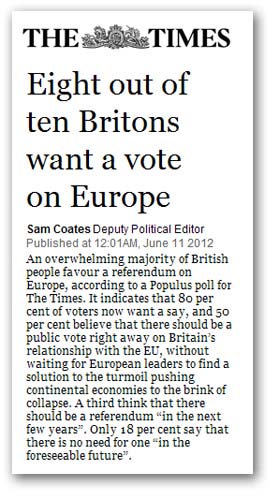11/06/2012
The Times peeps from behind its paywall this morning to tell us that an "overwhelming majority" of British people favour a referendum on "Europe".
This is according to a Populus poll commissioned by the paper, which finds that 80 percent of respondents now want a say, and 50 percent believe that there should be an immediate vote on Britain's "relationship" with the EU. A third think that there should be a referendum "in the next few years". Only 18 percent think a referendum is unnecessary.
Thus, a population which â we have been consistently told â is not interested in "Europe" now has eighty percent demanding a referendum on the issue. This might suggest that the EU is of slightly more concern than some would have it â although it might also indicate that public opinion can be manipulated.
Conscious though that the referendum can be the tool of the demagogue and is itself capable of infinite manipulation, one has to ask about what, precisely, the people want to vote. Is this a demand for a straight "in/out" referendum, or are we looking at another of these "renegotiation" fudges?
Reviewing the options, as
I did yesterday, a declaration of intent to withdraw is the only mechanism available within the treaties, by which a "relationship" with the EU can be forged. In any event, we have to be out of it to have a relationship with it.
An unfocused demand for a referendum, therefore, is not necessarily a good thing. We have been there before, with the plebicite misused to settle party differences rather than the question at large. And a commitment to "renegotiate" without first giving notice to quit is not a feasible option.
The upside of this is that, if the "colleagues" are determined to go ahead with their fiscal and political union, the
status quo works for us rather than against us in any referendum. Furthermore, there are circumstances evolving where we could benefit from the "affirmative" bias, where people tend to prefer a "yes" answer if it is on offer.
Possible questions for a future referendum are: 1) "do you wish to proceed to full political integration in the European Union (which includes joining the euro); or 2) do you wish the government to negotiate a new relationship with the EU?
As long as it is made clear that, in order to negotiate, we must first give notice to quit â but we than have two years to come to an amicable and realistic settlement â we are in with a chance. If this "game" is played badly, though, we could end up worse off than we are at the moment.
COMMENT THREAD

